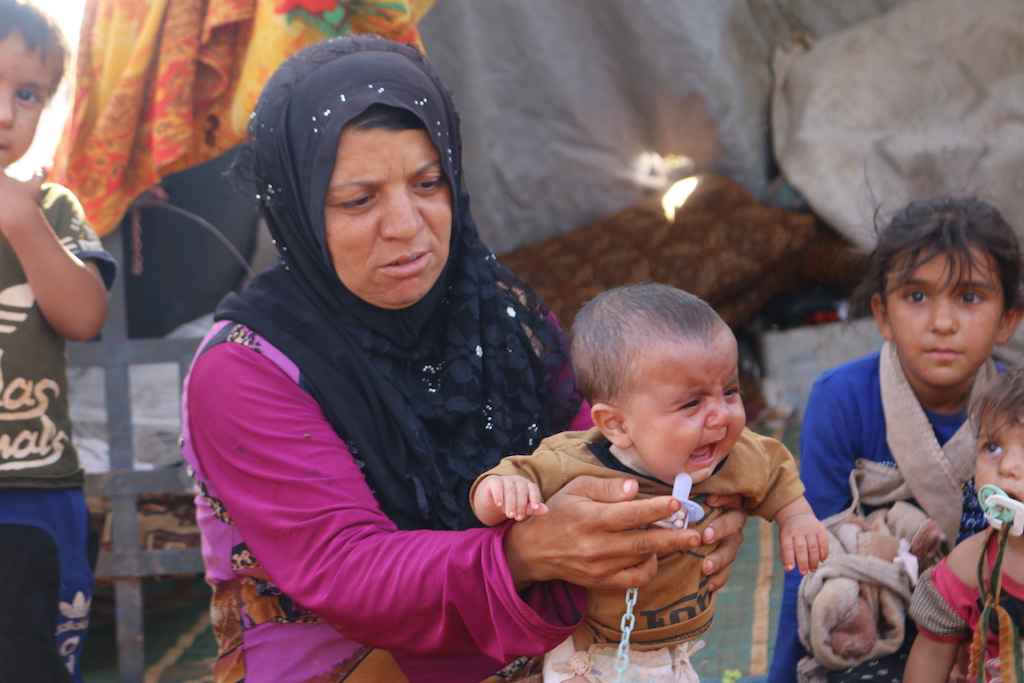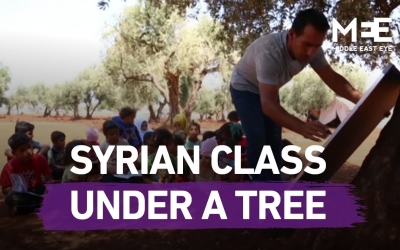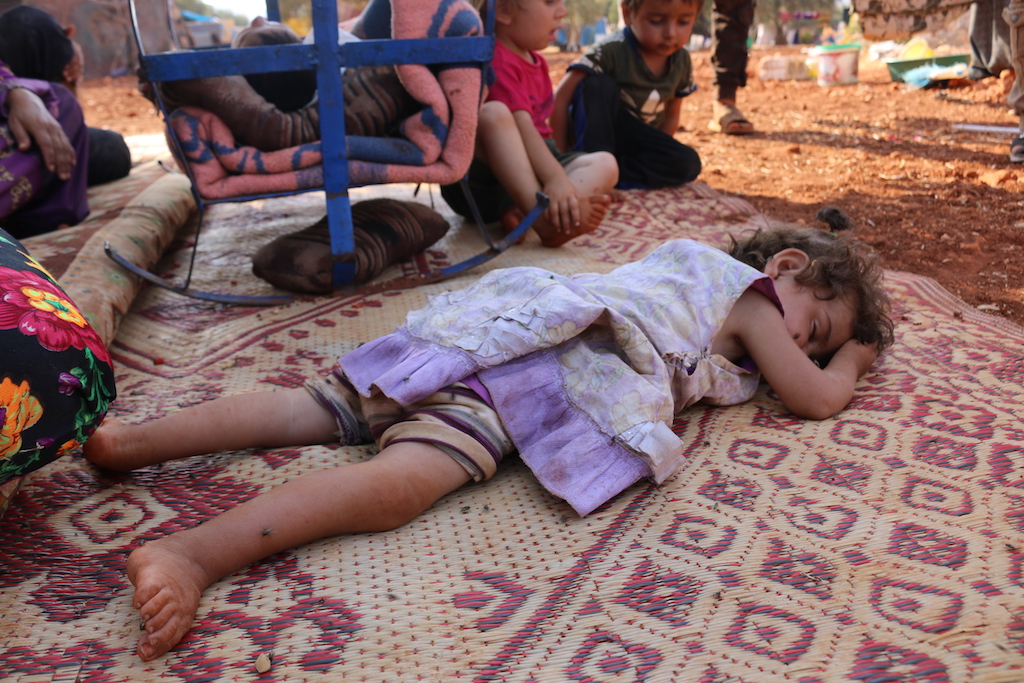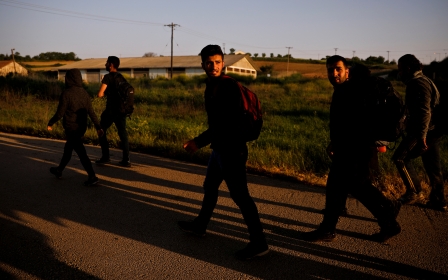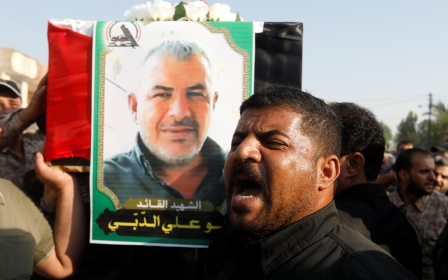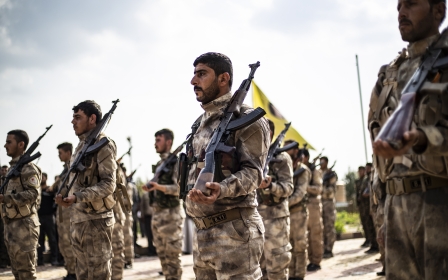'Unbearable': Displaced Syrians sleep in the open air fleeing government assault

Gesturing around the open airfield in northern Idlib, which has become his home, tears began streaming down Mohammed's face.
"Look around you: is this a healthy way to raise your family?" he asked.
Mohammed and his family came to the camp near the town of Hazano, 20km north of Idlib city, to flee the destruction raining down on Syria's last rebel stronghold, as the forces of President Bashar al-Assad and his Russian allies push northwards into the province.
While they are out of the immediate danger of air strikes and shelling, living conditions for the roughly 1,000 families living in the makeshift camp are grim.
New MEE newsletter: Jerusalem Dispatch
Sign up to get the latest insights and analysis on Israel-Palestine, alongside Turkey Unpacked and other MEE newsletters
Though some families were lucky enough to get a small tent and transform it into a temporary home, many families live under trees with no roof over their heads, often using small carpets and blankets to cover the ground to sit and sleep on.
The families also face other dangers, like snakes and scorpions. Parents fear children being bitten since it is hot and pests are common in the area.
"The situation is unbearable!" Mohammed shouted.
'Tragic' situation
Idlib is home to around three million people, many of whom were displaced from other opposition-held areas around Syria after their recapture by the government.
Pro-Assad forces have been making inroads into the south of Idlib, last week taking Khan Sheikhoun, a town on a key highway that runs through the province, linking Damascus to Aleppo.
On Saturday warplanes ceased their bombing after the Syrian government and Russia announced a unilateral ceasefire, though previous truces have lasted just days, if not hours.
Ahmed al-Abedo fled to the makeshift refugee camp from the town of Kafranbel in Idlib's southern countryside, along with his five children, to escape government attacks.
"We had to leave as the regime carried out continuous raids for four consecutive days on our neighbourhood," he told Middle East Eye. "The heavy bombs destroyed our houses and neighbourhood. We had no choice but to leave."
Like many families, he and his children - the oldest is nine and the youngest is six months old - have little or no shelter from the elements.
"We want tents. It is essential as next month there will be rain," he explained.
"Our situation is tragic: we have no toilets, little water and no money."
He said that he worked sometimes, but that it was not enough to feed his children, especially with a small baby in a crib continuously crying from hunger and discomfort under the trees and the hot sun.
"Older people can tolerate such a situation but little children cannot," he said.
The Idlib health directorate said between April and 21 August, the number of displaced in the governorate had reached 910,000, with 198,000 arriving between 11 August and 21 August.
There are no toilets in the field, with people instead using open areas to relieve themselves. Mustafa Abdo, a doctor and spokesperson for the directorate, said there was an urgent need for tents, medicines and food supplies. He added that health problems like diarrhoea, lice and skin diseases would soon hit the refugees due to a lack of proper accommodations.
The exhaustion is beginning to show for a number of families, with few getting decent sleep out in the wild. Children look tired, covered in dust and flies.
"Yesterday I stayed up all night watching my children sleep to protect them from poisonous insects, snakes and scorpions," said Fatima, who fled the town of Kafr Ruma.
"There we never slept from the continuous shelling, and here we are not sleeping out of fear of snakes and scorpions."
'We are left with nothing'
More than 370,000 people have been killed and millions displaced since the beginning of the Syrian civil war in 2011.
Despite repeated victories and defeats, the majority of the country has been retaken by forces loyal to Assad, with only Idlib left controlled by rebels, primarily by the former al-Qaeda affiliate Hayat Tahrir al-Sham (HTS).
The ongoing aerial and ground offensive against Idlib has come despite a deal struck between Russia and rebel backer Turkey in September of last year to implement a buffer zone in the area.
Though Turkish troops deployed to 12 monitoring points around the designated buffer zone, the plan has so far not been carried out - although Russia announced on Friday that Syrian government troops would unilaterally uphold a ceasefire starting on Saturday.
Since April, increased bombardment by the Syrian military and Russia has killed more than 950 civilians in Idlib.
With Turkey reluctant to add to its already 3.7 million Syrian refugees, residents of Idlib are left with virtually nowhere else to flee.
"We seriously need the help of international organisations as our situation is miserable and children are getting very sick due to the situation we live in," said Ibrahim Arnous, a resident of the makeshift camp.
"I have no work and no money. I live on the help of some good people who give us food," Arnous said. "My concern is not for myself - we can live without bread. But my seven-month-old baby needs milk and we cannot get it. We only have some trees to protect them from the hot sun."
His relative, Sana Arnous, who also fled to the camp, said she also needed to look after husband, who she said had suffered memory loss after a shell hit their home in the village of Alteh in Idlib's southern countryside.
"Since then, he does not recognise his children or me," she said. "I feed him and I take him to the toilet.
"We do not have money to rent a home. We were the last family to leave the town because we are poor. We did not have money to leave," she said.
"We are left with nothing."
This article is available in French on Middle East Eye French edition.
Middle East Eye delivers independent and unrivalled coverage and analysis of the Middle East, North Africa and beyond. To learn more about republishing this content and the associated fees, please fill out this form. More about MEE can be found here.


